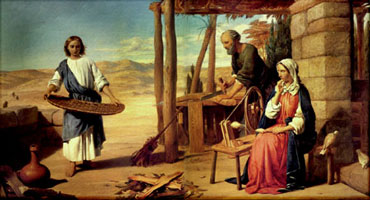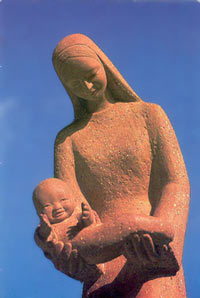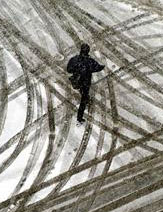|










|
|
- The Holy Family
- Mathew 1, 18, Luke 1,
26-39; 2, 41-51
It is under the name of the Holy Family that the composed
family of Jesus, Mary and Joseph, is proposed as a model during
the liturgy after Christmas and for the spirituality of families.
Is that not surprising and what exactly is the situation about
this family?
-
 |
Family ties are far from simple. Mary is really the mother of
Jesus, but the conditions under which she gave him birth are
still mysterious today. It is the angel, Gabriel, thought of
to be a messenger of God, who announces to Mary that she will
have a child. Is it indeed the vehicle of what is modestly named
the shadow of the Holy Spirit since answering Mary's question
" How can this happen since I am still a virgin? The angel,
sure of himself, says "The Holy Spirit will cover you of
his shadow"? In the Scriptures we find annunciations from
an angel to Sara, Abraham's spouse and mother of Isaac and also
to Elizabeth, Mary's cousin, mother of John the Baptist. These
two women were infertile and had past the age to bear a child.
We find virginal births in other mythologies. In these cases,
it is a way of saying that the child who is to be born will be
an exceptional person.

|
What did really happen? We know nothing. Is Mary a surrogate
mother of a child of an undetermined origin or an unmarried mother
that Joseph saves from dishonor? In fact Joseph is ready to secretly
repudiate Mary to whom he is already engaged, because she became
pregnant before they lived together. He is not the biological
father of Jesus. |
-
- However it is through him that Jesus' lineage is established,
making Jesus a member of the family of David. The adoption of
Jesus by Joseph is a strong deed. His contemporaries simply call
him" Son of Joseph". Mary is not excluded from this
lineage in the genealogy given by Mathew (1.1) since in Jesus'
lineage. Joseph is named "the spouse of Mary". This
has to be underlined in a culture where it is generally the woman
who is identified by the name of her husband.
Was the child informed or had the intuition of his mysterious
origin? As a teen-ager was he looking for his true father? Could
it be the cause for running away during the pilgrimage at Jerusalem?
During this time, Jesus could have discovered another lineage,
the one related to a transcendence that he called his Father.
But his parents did not understand him when he said he has "to
be at his father's business". After this episode, he quietly
staid at home, he learned Joseph's trade and carried it on up
to 30 years of age. The Gospel says nothing about the relationship
between Joseph and Mary, we may suppose they have been happy
together. One may also suppose that they had other children,
since in the Gospel it is spoken of the brothers and sisters
of Jesus. When Mary gives birth to Jesus, Luke qualified him
"her first born son". We have translated this expression
into " only son" but it could as well be translated
into "eldest son" Whatever these points, during his
few years of public life, Jesus never emphasized his blood ties:
"Who is my mother, or my brothers? Whoever shall do the
will of God, is my brother, and my sister, and my mother (Mark,
3, 33-35)" and " who loves father or mother,…,
son or daughter (his wife in Luke) more than me is not worthy
of me (Matthew 10, 37)". Does he minimize the familial ties
or instead open them up to other relationships? Is not this a
door open for a closed knit family by allowing its members, his
mother, his possible brothers and sisters to establish new relationships
and new vocations?
What can be concluded from this lecture about the "Holy
Family"? that there is no model of family life. Conception
of a child outside marriage is not necessary to be condemned.
The adoption of a human being shows that a biological link is
not the only possible link between parents and children. Well
behaving and stable children can be raised in different forms
of family life. The run away child is a source of anguish and
misunderstanding for his parents, however sometimes it is an
essential step for him. A closed knit family does not favor the
blossoming of its members.
-
|
Accordingly, all the families qualified as out of norms are
at least recognized if not sanctified. Let us think of families
with only one parent, with adopted children or recomposed and
also with children from broken homes or with children obtained
by medical assistance. |

|
Once more, the Gospel seems to be breaking all-made social models.
Jesus makes a stand against all the ties hampering the liberty
of mankind: family ties as mentioned here, but also social or
religious ties.
|
